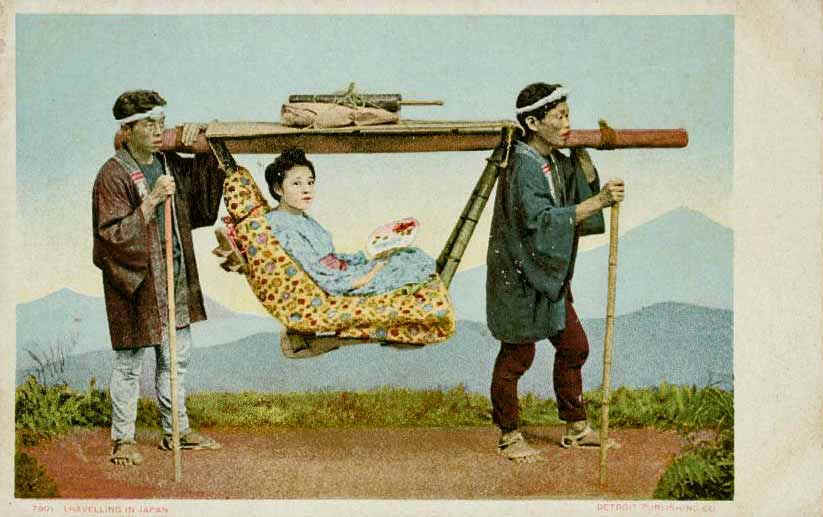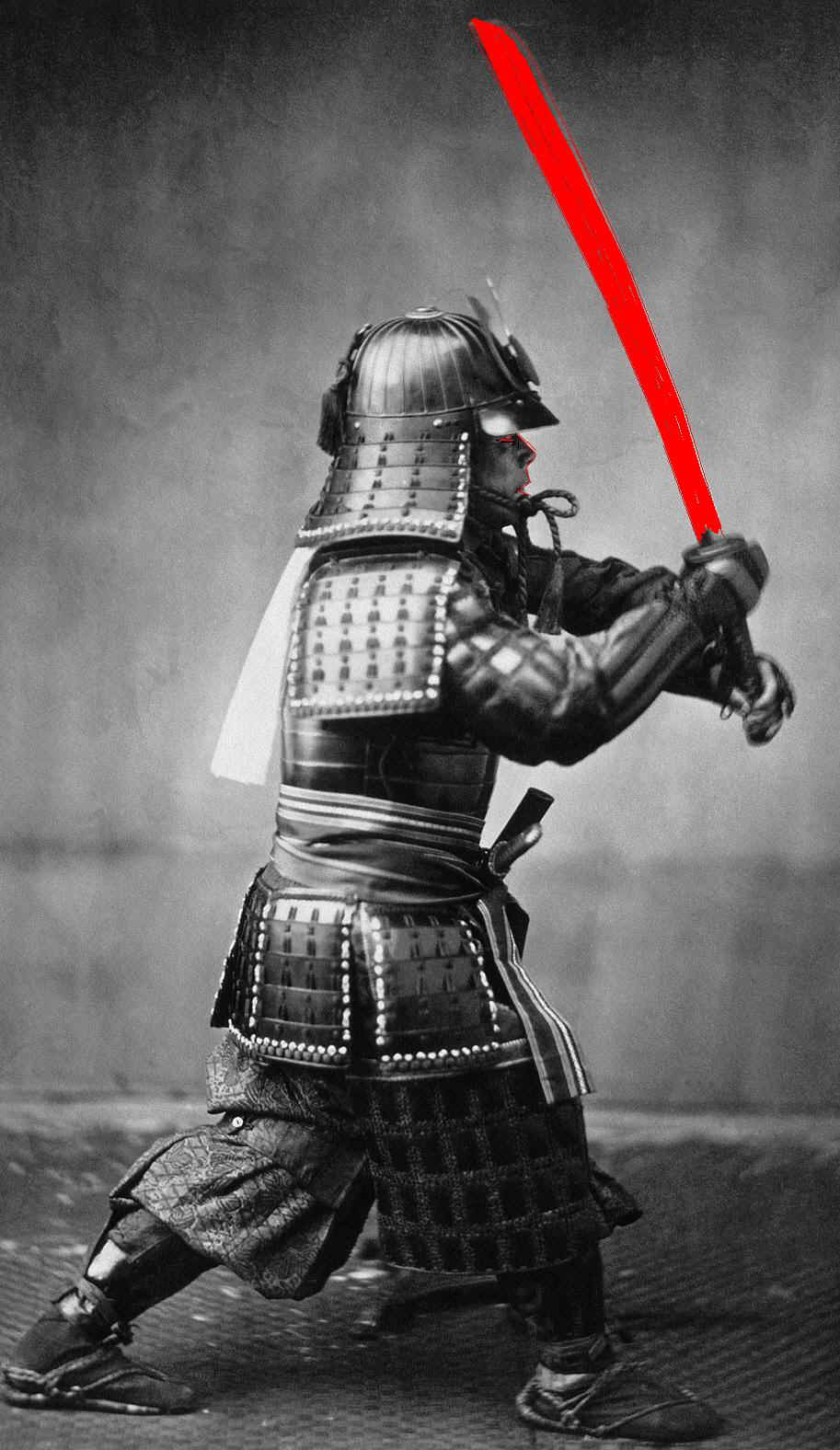
Daily Blog - Tiger Software
December 7, 2011
JAPANESE CRUELTY
Remember the 300,000
Killed
by the Japanese in The
Nanking Massacre.
Whale Screams of Pain
Origins of German Fascism
What Made The Japanese
So Militaristic and Brutal
from 1900 to 1945?
Contemporary Japanese
Leaders Deny
Japanese War Guilt
Extreme Nationalism
Is on The Rise Again..
__________________________________________________________________
Index
of All Tiger Blog Topics www.tigersoft.com
People
have asked me to write a Daily Blog.
They seem to want me to give them a thought
or two each day. About what? Well,
we'll just
have to wait and see. As, I see it, a blog is a
personal statement. I will try to make it enter-
taining and relate it mostly to the stock market.
to william_schmidt@hotmail.com
The Origins of JAPANESE CRUELTY
and IMPERIALISM: 1871-1945
--------------------------------------------------------------------------------------------------------
There is so much evidence of rabid, sadistic, pathological Japanese cruelty.
Does it still lie latent now in Japan, ready again to be unleashed?.
The World must keep Japan muzzled and disarmed. It cannot take a chance.
And we must learn what were the origins of this mass psychopathology,
to take steps to prevent its reoccurrence elsewhere and in us, too!
--------------------------------------------------------------------------------------------------------
OUTLINE:
1. The Origins of Japanese Cruelty. The Butality of the Samari.
2. A Culture made for war. Conformity, docility, blind obedience and willingness to
believe whatever authorities, like the Emperors say.
3. Remember the 300,000 Killed by the Japanese in The
Nanking Massacre.
4. Have The Japanese Changed?
5. Whale Screams of Pain
6. Origins of German Fascism
7. Japan's Ugly, Violent History: 1850-1945
There need not have been war. "War is a cultural contagion, a meme that serves its own ends,
not ours (except for certain profiteers perhaps). Wars happen because of their cultural acceptance
and are avoided by their cultural rejection. Wars are not created by genes or avoided by eugenics or oxytocin,
driven by an ever-present minority of sociopaths or avoided by controlling them, made inevitable by resource
scarcity or inequality or prevented by prosperity and shared wealth, or determined by the weaponry available.
All such factors ... can play parts in wars, but the decisive factor is a militaristic culture, a culture that
glorifies war or even just accepts it, a culture that fails to renounce war as something as barbaric as cannibalism.
War spreads as other memes spread, culturally. The abolition of war does the same." (David Swanson)
By accepting what we are told about War always being a condition of Mankind, we make it so.
Just as by accepting that there will always be poverty, we make it so.
====================================================================================
The Origins of Japanese Cruelty
20 million people died as a result of Japan's brutal aggressions in World War II.
Americans know much more about the consequences of German fascism. Japan's
murderous path should be studied more, especially by the Japanese who still refuse
to take responsibility for their grandfathers' cruelty. Japanese troops were carefully
trained to become sadistic, psychopathic killers. Who did this? How? Why?
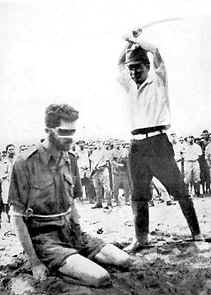
http://www.pacificwar.org.au/WarCrimeIntro.html
The evidence shows Japanese cruelty grew as their Empire did. Is it more pronounced
and widespread than in most other countries? Yes, I would say, though I understand
that prolonged war brings such behavior out in most military campaigns cruel treatment
on all sides. My sense is that it was the belief that the Japanese could not be trusted
to really surrender that bred much of the American soldiers' hatred for them. Fair play
was not reciprocated. One cannot imagine fraternization between the the Americans
and the Japanese armies, as happened in 1914 and 1915 in No Mans' Land between
the Germans and the British. http://www.axpow.org/peaceinnomansland.htm
The Japanese especially believed in their own superiority and the non-humanity of
their enemies. Japanese Shintoism became the official State religion. It was taught
in schools and honored in all official gatherings. The Emperor was divine. The Japanese
people were racially superior. Nationalism like this was deliberately instilled to serve
the purpose of the war-making Úlites. Xenophobia and racism had to be carefully
inculcated in the Japan people so that the introduction of American and then
Western European technologies and thinking after the 1850s would not threaten
the Japanese ruling elite's status and control. Creating foreign enemies is a right-wing
tactic, the world over. What we Americans do not know is that Teddy Roosevelt
secretly encouraged Japanese racism and viewing China and Manchuria as
Japan's natural areas to conquer and colonize. See The Queasy Side of Theodore Roosevelt's ... - New York Times
Japan
society was authoritarian and rigidly and hierarchical before and after the onset of
deliberate modernization in the 1870s. It was a repressed society. Males
dominated.
Obedience, loyalty to one's superiors and ferocity were the most important and most
inculcated values, Compassion, charity, kindness were not taught or valued.
The
Emperors did not urge these values. Nor did the Shoguns or Samurai. Nor did
the
civilian political leaders. Nor did the intellectuals. Vile, barbarous cruelty
was not
condemned. Bullying, picking fights, cruelty and killing were, at first, ignored
and
not
condemned. Then they were condoned and rationalized away. Eventually,
they
were honored by the Japanese military leadership at the peak of its rabid
degeneration.
Some
accounts claim that the Russian POWs of 1905 were treated humanely and that
the
Japanese Samurai
inspired military code originally encouraged respect for one's
military
enemies and for prisoners. It is argued in these accounts that the original
Samurai code was perverted by the Emperor and the Imperial Staff as they had
it
taught throughout Japanese society, when it was made out that any compassion
shown
a defeated enemy weakened the new Japanese Samurai national spirit
I
believe it is a mistake to attribute compassion to the Samurai. One can easily
find
countless instances and citations of wonton Samurai cruelty. Be that as it may,
a
brutalization occurred not far into the XXth Century. I would suggest that the
Japanese observed how savagely Western armies killed each other in World War I.
Seeing that, they might well have considered Western Christian missionaries
who
preached peace, charity, compassion and love for one's enemies to be really
teaching others how to be slaves, while the armies of the countries that these
missionaries came from built vast empires.
Certainly, as fascist, ultra-nationalist hubris became entrenched, the XXth century
Japanese "Samurais" created pretexts for new wars, assassinated politicians and
became ever bolder and more brashly violent. Why kill civilians and bayonette
babies?
Because, they felt exalted at the complete vanquishing of their enemy. They combined
Samurai violence, Shintu racism with Western Imperialism and technology. They
then
simply carried out each to their logical and most extreme form.
Pecking
order brutality was institutionalized. As the cult of Japanese military savagery
became
dominant, violent abuse of subordinates became the norm and was EXPECTED:
"In the 1930s, Japanese military
recruits began to be subjected to intensive indoctrination
in the tenets of bushido and Shinto. A culture of extreme brutality was also encouraged
within the military itself. If a Japanese colonel was displeased with one of his majors,
it would not be unusual for the colonel to strike the offending major a blow across
the face to reinforce his reprimand. The major chastised in this way would be expected
to strike one of his captains who had incurred his displeasure. This brutality would be
passed down the line from the Japanese officers to their own enlisted men who would
then be expected to beat each other up. At the end of this chain of brutality were the men
perceived by the Japanese to be the lowest of the low, their enlisted Koreans and
Taiwanese,
who received the worst beatings. The disgruntled Korean and Taiwanese camp guards
had no one but the prisoners of war to beat up, and they were viewed by many prisoners
as being the most brutal of their guards."
http://www.pacificwar.org.au/JapWarCrimes/Explaining_JapWarCrimes.html
They
did not heed the Geneva conventions or allow Red Cross aid or observers reach
their
Prison camps as the Germans did. Their Bushido military code required their soldiers
to
fight to the death and never surrender. They did not respect prisoners who
surrendered.
Whole
regiments held be-heading contests, supposedly to make their soldiers
obedient killers without conscience.
But
why were they cruel to civilians? Why would they force women and children into
a
tall building and set it on fire? Even
NAZI observers protested this. Why did Japanese
generals encourage stories about their army's atrocities. The Nazis and the German
Generals concealed the concentration camps as much as possible from the general
public.
I
have found no evidence that suggests American, British or ANZAC troops
mistreated non-combatant civilians.
That
Japanese cruelty was so ferocious towards the Chinese in the 1930s makes
it
clear that it did not develop late, as a result of war weariness or as the Japanese
started to lose battle after battle, when one might otherwise argue that they might
have
been more likely to vent frustration with aggressive violence and to suppress
their
inner self-doubts by being cruel towards those they could still control.
"The depravity of the
Japanese troops is not surprising having regard to their being
taught that Chinese were "chancorro", or sub-human, and that the killing of Chinese
was of no greater significance than the killing of vermin. Chinese civilians were
rounded up on the slightest pretext to provide Japanese troops with bayonet
practice."
( http://www.pacificwar.org.au/JapWarCrimes/Explaining_JapWarCrimes.html
> Japanese
Sneak Attack on Russians in 1904
>
Japanese Sneak Attack on and US in 1941.
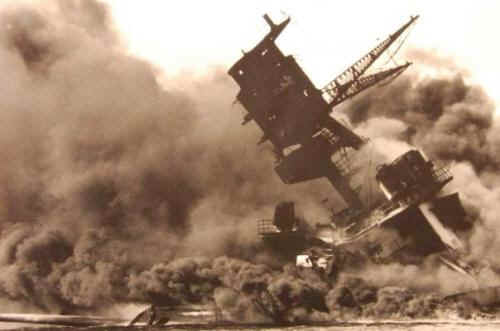
> Japanese Unprovoked Invasions of Korea, Manchuria,
China, SE Asia, Phippines.
>
Japanese massacres:
Nanking 300,000 Chinese killed.
Zhejiang-Jiangxi Campaign
250,000 Chinese killed.
>
Biological war experiments Unit
731
>
Atrocities in Philippines - Manilla
Massacre 100,000 civilians in Philippines killed.
> Bataan Death March
> Burma - 250,000 civilians killed.
I
recommend viewing the movies Empire of the Sun and Bridge over the River Kwai
Japanese
war crimes - Wikipedia, the free encyclopedia
Remember the
300,000 Killed by the Japanese in The
Nanking Massacre.
300,000 Chinese were killed in the Nanking Massacre
This kind of monstrosity should not be ignored or ever forgotten.
The Japanese avoid admitting their guilt. They should feel acutely shamed,
just as the Germans do and Turks should for their massacre of a million
Armenians in World War I.
"The Japanese did not
just kill the Chinese civilians, they tortured them in any and
every cruel way
possible and enjoyed the power of doing so. The soldiers raped the
women, set people on
fire, ripped out beating hearts and took pictures as souvenirs…
In most these pictures
the Japanese monsters are smiling, surrounded by the bloody victims.
In fact it was so
horrific that there are even reports that some Nazi soldiers tried to help
some of the innocent
Chinese citizens. It’s a sad state when a culture is so sick and
inhuman that make the
Nazis look “warm” by comparison...
The Japanese knew which
form of torture would
produce the most painful experience
for the victim before
they would die. The soldiers performed disembowelment,
decapitation,
crucifixion, carved out big pieces of human flesh, and there are incidents
where the Chinese had
their eyes gouged out and their noses and ears chopped off
before setting them
aflame. The Japanese troops gathered a group of about 200 people
and “stripped
naked, tied to columns and doors of a school, and then stabbed [them with]
zhuizi -special needles
with handles on them- in hundreds of points along their bodies,
including their mouths,
throats, and eyes.”
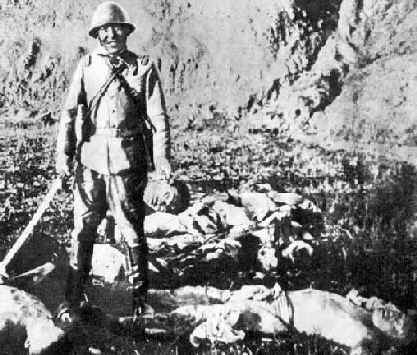
Have The Japanese Changed?
Where Is The Remorse?
"Why should it matter any more?"
Prime Minister Ryutaro Hashimoto's response to criticism of his paying homage
to Japan's worst war criminals at the infamous Yasukuni Shinto Shrine in Tokyo (1996).
Please go
to http://www.pacificwar.org.au/WarCrimeIntro.html
to see more evidence than I canb oresent.
"The Pacific War was a war of liberation..." Nagano
Shigeto, Japan's Justice Minister (1994).
"The Pacific War was a war to liberate
colonised Asia."
A resolution moved in the Japanese Parliament
(the Diet) in 1995 by 221 members
of Japan's long-dominant Liberal Democratic Party (LDP).
"Japan was forced to go to war by American oil and
other embargoes."
Hosei Norota, senior member of Japan's ruling Liberal Democratic Party (2001).
"Japan was forced into WW II to liberate Asia from the yoke of Western
colonialism."
Hideaki Kase, producer of the controversial Japanese film "Merdeka" (2001).
"The Nanjing Massacre is a lie made up by the
Chinese."
Ishihara Shintaro, former Japanese Cabinet Minister, interviewed October 1990.
..the Nanjing Massacre is a fabrication.
Nagano Shigeto, Japan's Justice Minister (1994).
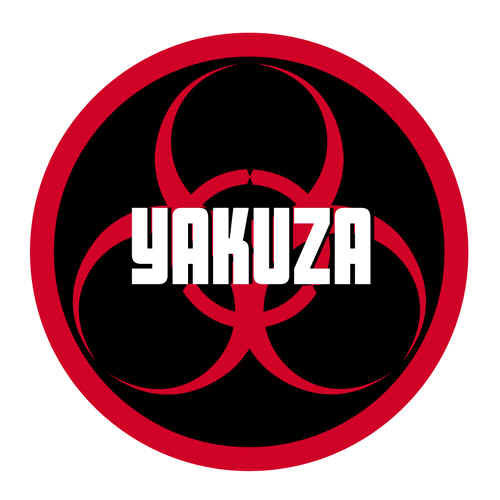 The right-wing
fascist crime families (Yahuza) pressure
the Japanese Government to resist
The right-wing
fascist crime families (Yahuza) pressure
the Japanese Government to resist
international demands that whale
killing be altogether stopped.
Yakuza:
The Warlords of Japanese Organized Crime
http://www.econ.ucsb.edu/~tedb/eep/news/endspecies.html
Sea
Shepherd's Rosie Kunneke - Kidnap Attemot by Yakuza Gangsters
One
in four consider the fascist Yakuza criminals "a necessary evil".
BBC
News - Exposing the world of Japan's yakuza mafia
The Japanese Government STILL refuses to require the real story of Japanese mass
murders of Chinese in the 1930s be made part of the required reading of young
Japanese.
"In 2007, the
Japanese government conducted a poll asking whether non-Japanese
people deserved the
same human rights as Japanese people. 41% of Japanese people
answered in the
negative."
( See http://www.globalization101.org/issu...sPerspectives/ )
Visit the Edo-Tokyo Museum. There is only one wall panel given to the rise
of
militarism in Japan in the 1920s and the 1930s. Much more space is given to
American fire-bombing of Japan and post war scarcities. More attention was
given to a display of the medals warded Japanese fighters at this time.
Source.
"Japan banned all japanese invasion films in their country and all their textbooks
are revised.
Theirs wrote that they were there to liberate the people from their colonisation and
corrupted government. And that 'there's no cruelty involved'. It shows japanese soldiers
playing with children when throughout Asia, (China, korea, taiwan, singapore, manchuria,
malaysia etc,
all our textbooks showed the same, consistent cruel methods of torture they used). And the
japanese
government and people visit their war heroes shrine every year. 'War hero' meaning those
who
died while trying to invade Asia." Source.
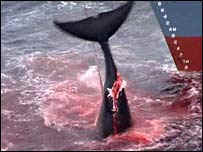
Whale Screams of Pain
Japanese Cruelty Continues towards Whales, despite their suffering.
Video - http://www.youtube.com/watch?v=H0q2CqkdPFk
It takes these intelligent mamales
30 minutes to die when harpooned. Japamese
Whaling - Cruelty beyond Belief
Save
the whales BOYCOTT JAPAN Petition
Boycott
Japan | Facebook
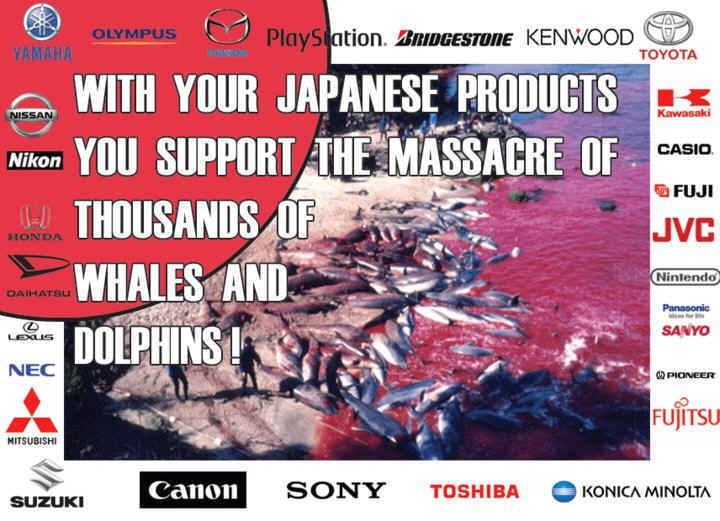
As a history major, I learned enough to
understand intellectually what were the forces that led to Hitler
and Germany's Attack on Russia, Jews and all of
Europe. Now it's high time to study the Japanese
descent into similar levels of rabid mass
cruelty and barbarity, all in the name of a divine Emperor,
rejuvenating Japanese blood and national
identity and building a far-flung imperial Japanese
"Co-Prosperity Sphere". As in
Germany, ruthless violence against opponents and foreigners was
encouraged to instill courage, character and
selflessness before the all powerful State and to destroy
Parliamentary Democracy, Tolerance, Labor
parties, rationalism and truth.
Lyrics from NAZI Storm Trooper song:
"Blut muss fliessen, Blut muss fliessen! Blut muss fliessen
Knuppelhageldick! Haut'se doch zusammen,
haut'se doch zusammen! Diese gotverdammte Juden Republik!"
Ttranslation: "Blood must flow, blood must flow! Blood must flow as cudgel thick as
hail! Let's smash it up,
let's smash it up! That goddamned Jewish republic!" Source
|
From a Japanese soldier's diary in 1937
"Recently, when we were very bored, we had some fun killing Chinese. We caught
some innocent
Chinese and either buried them alive, or pushed them into a fire, or beat them to death
with clubs,
or killed them by other cruel means.”
Origins of German Fascism
We can learn about Japan and
America, too, by first considering the main factors that lead
to German Cruelty,
Expansionism and Fascism.
1) Prussian Militarism, Blind Obedience, Belief that Might makes Right ("Macht ist
Recht")
2) World War's Humiliating Peace Treaty. Specifically the Allied demands for huge
reparations
which led directly to Weimar Germany's hyper-inflation and the destruction of the Middle
Class.
3) The Failure of Capitalism for Millions. Economic Depression radicalized and
polarized
German Politics. Hitler's NAZI Party got more votes in 1932 than any other
German
political party. Rich industrialists became afraid of the Political Left and gave
more and
more money and political backing to the NAZIs.
4) Germany's workers had long been socially, politically and economically separated
from
middle class Germany and the Catholic Church. See writings of Peter
Gay about the
extreme social gragmentation of Germany before and after World War I. As a result,
the Catholic and Protestant churches were mostly silent when unions were abolished and J
ews persecuted. After the unions, socialists and Communists were squelched, the
NAZIs could
suppress dissidence within the Churches. the Nazis consciously pursued this
"piecemeal strategy"
See Gleichschaltung
.
5) Wealthy industrialists back the Nationalist and NAZI Parties out of fear of workers,
Socialists (SPD)and Communists (KPD). See http://reformed-theology.org/html/books/wall_street/chapter_07.htm
http://www.nizkor.org/hweb/imt/nca/nca-01/nca-01-08-economic-mobilization-02.html
In particular, see the role of steel iindustrialist, Fritz Thyssen, who was a big backer
of
Nazis after 1922 Thyssen pressured the elderly German President von Hindenburg to
name Hitler as Chancellor in 1932. http://en.wikipedia.org/wiki/Fritz_Thyssen
-------------------------------------------------------------------------------------------------------------------------------------------------------
Academic America Protection of Big Business
Ivy League Suppression of Ideas
Princeton denied tenure to David Abraham for arguing in behalf of the role of Big Capital
behind Hiutler's rise. Yale gave tenure to Henry Ashby Turner for
disputing their
key role. A number of other historians - Arno J. Mayer,
Carl
Schorske, Thomas Bender,
and Natalie
Zemon Davis, came to Abraham's defense. (My own experience at Yale,
a history major, demonstrates that Department's unwillingness to see America's role in
creating
Japanese imperialism, as will be discussed more below.)
------------------------------------------------------------------------------------------------------------------------------------------------------
6) Widespread Anti-Semistism, German Racism and Sense of Superiority, which was fed by
the music of Wagner and then NAZI propaganda.. The National Imperialist demand
for Space to Expand Into, Foreign markets and "Lebensraum"
7) Hitler's Carisma and the Use of Mass Propaganda to Glorify Die Fuhrer.
8) Unbridled Terror: Gestapo (Secret Police) made a challenge of Hitler very difficult.
Arresting all potential opposition.
9) The German Army failed to resist Hitler's dictatorship successfully because as a
class they benefitted until the War by the actions of his regime.
10) France, UK and US did not want to get involved in another war like World War I,
which was
believed to have been started to rapidly by rash mobilization and an arms race.As a
result, they did
not stand up to Hitler when their opposition might have caused his over-throw:
1935 - the remilitarization of the Rhineland and
1938 - the Invasion of Czechoslovakia when key German generals were ready to stage a coup
against
Hitler.
THE ORIGINS OF JAPAN'S CRUELTY
from 1900-2045
It is not surprising how many similar forces were at
work in Japan. Fascism
is Fascism. The Japanese admired NAZI brutality and vice verse. Fascism
is the open terrorist dictatorship of the most brutal, violent, reactionary, chauvinistic
and most imperialist."
What Made The Japanese So
Militaristic and Brutal
But
what may amaze some readers, is the degree to which the
Japanese
were initially ecouraged by, and simply doing what, their American
mentors,
like Teddy Roosevelt, were advising, as they tried to catch up
with
the Europeans and the US.
What exactly led to Japanese military aggression, expansion,
racism
and widespread cruelty everywhere they went: Korea, Manchuria, China,
The Phlilipines, Burma? Where did all this terrible energy come from?
I realize that war brings out the worst (and, maybe, the noblest and most
selfless
Remarkably, until the late 19th century Japan had remained isolated, independent and
never held territorial possessions either on the mainland of Asia or nearby islands,
with the exception of some colonization of Korea in the 16th century.
Imperialism in Japan was boosted not
just by adopting European technologies,
but by its adaptation to itself of the same amoral Social Darwinian thinking that
approved of Manifest Destiny, the destruction of Native American people and culture
and the wholesale plundering of limited natural resouces, all for selfish profit:
And racism. The Japanese sought to be the Aryans of the East. .

In
1853, Commodore Perry sailed into Tokyo Bay and demanded that Japan open
its ports for trade. Japan
agreed. "Most favored nation" trading privileges were soon
granted the Europeon countries, too.
Incidents between the Japanese and the foreigners
led to the British Naval ship firing its
guns on a Japanese port. Again, the Japanese
yielded, but to
avoid future humiliations began to copy the foreigners' technologies
and imperialist world-view.
MEJII Modernization
A 16-year old emperor, MEJII,
took the throne. His advisors sought to modernize Japan
while
adopting their foreign technologoes and adapting their ways of thinking,
too.
From the British, they patterned their new
Navy. Along Prussian line, their built
a new conscript army. Banking, a legal
system and a parliament were created.
The government set up key railroads, textiles,
etc.and then turned them over to private
interests. Overseas colonies were
sought, just as the Europeans had. Social Darwinism,
the survival of the fittest, "Macht
ist Recht" philosophies rationalized the new
Japanese Imperialism much like they had
European imperialism. Missing from Japan
in these years was any sense of Yankee
noblesse oblige, British (As in Kipling)
paternaism or French cultural
egalitarianism. .
In 1872 the U.S. military
began training the Japanese in how to conquer other nations,
with an eye on Taiwan. Charles LeGendre,
an American general training the Japanese
in the ways of war, proposed that they adopt a
Monroe Doctrine for Asia, that is a
policy of dominating Asia in the way that the
United States dominated its hemisphere.
Japan established a Bureau of Savage Affairs
and invented new words like koronii (colony).
Talk in Japan began to focus on the
responsibility of the Japanese to civilize the savages.
In 1873, Japan invaded Taiwan with U.S.
military advisors. And Korea was next.
(See James Bradley's
The
Imperial Cruise: A Secret History of Empire and War
and the discussion on
Amazon.)
TEDDY ROOSEVELT and JAPANESE IMPERIALISM
But what may amaze some readers,
is the degree to which the
Japanese
were initially ecouraged by, and simply doing what, their American
mentors,
like Teddy Roosevelt, were advising, as they tried to catch up
with
the Europeans and the US.
What exactly led to Japanese military aggression, expansion,
racism
and widespread cruelty everywhere they went: Korea, Manchuria, China,
The Phlilipines, Burma? Where did all this terrible energy come from?
Remarkably, until the late 19th century Japan had remained isolated, independent and
never held territorial possessions either on the mainland of Asia or nearby islands,
with the exception of some colonization of Korea in the 16th century.
Imperialism in Japan was boosted not
just by adopting European technologies,
but by its adaptation to itself of the same amoral Social Darwinian thinking that
approved of Manifest Destiny, the destruction of Native American people and culture
and the wholesale plundering of limited natural resouces, all for selfish profit:
And racism. The Japanese sought to be the Aryans of the East. .

In
1853, Commodore Perry sailed into Tokyo Bay and demanded that Japan open
its ports for trade. Japan
agreed. "Most favored nation" trading privileges were soon
granted the Europeon countries, too.
Incidents between the Japanese and the foreigners
led to the British Naval ship firing its
guns on a Japanese port. Again, the Japanese
yielded, but to
avoid future humiliations began to copy the foreigners' technologies
and imperialist world-view.
MEJII Modernization
A 16-year old emperor, MEJII,
took the throne. His advisors sought to modernize Japan
while
adopting their foreign technologoes and adapting their ways of thinking,
too.
From the British, they patterned their new
Navy. Along Prussian line, they built
a new conscript army. Banking, a legal
system and a parliament were created.
The government set up key railroads, textiles,
etc.and then turned them over to private
interests. Overseas colonies were
sought, just as the Europeans had. Social Darwinism,
the survival of the fittest, "Macht
ist Recht" philosophies rationalized the new
Japanese Imperialism much like they had
European imperialism. Missing from Japan
in these years was any sense of Yankee
noblesse oblige, British (As in Kipling)
paternaism or French cultural
egalitarianism.
In 1872 the U.S. military
began training the Japanese in how to conquer other nations,
with an eye on Taiwan. Charles LeGendre,
an American general training the Japanese
in the ways of war, proposed that they adopt a
Monroe Doctrine for Asia, that is a
policy of dominating Asia in the way that the
United States dominated its hemisphere.
Japan established a Bureau of Savage Affairs
and invented new words like koronii (colony).
Talk in Japan began to focus on the
responsibility of the Japanese to civilize the savages.
In 1873, Japan invaded Taiwan with U.S.
military advisors. And Korea was next.
(See James Bradley's
The
Imperial Cruise: A Secret History of Empire and War
and the discussion on
Amazon.)
Japan
Invades Taiwan with Samurai, 1873 - This was Japan's first overseas
military adventure. "The
rationale was to threaten China, thus allowing Japan to
wrest the island of Okinawa from China's orbit, an idea cooked up by
the
Japanese foreign ministry's first
foreign employee--a retired American Civil War
general. The excuse was that the
Taiwanese had abused Okinawan civilians.
The Japanese invaders sailed on
American-made ships with U.S. Navy advisers."
http://www.jamesbradley.com/the-real-lesson-of-pearl-harbor.htm
"Domestically, the
action also mollified those within the Meiji government
who were pushing for a more
aggressive foreign policy, and who were enraged
by the government's refusal in
1873 to attack Korea.
It is significant that the
expedition took place shortly
after the Saga
Rebellion, and was led by Saigo Judo
(Saigo Takamori's
younger brother) and consisted largely of former Satsuma
and Saga samurai."
http://en.wikipedia.org/wiki/Taiwan_Expedition_of_1874
China's
weakness sin this erved as an invitation to the French who invaded
Taiwan in October 1884.
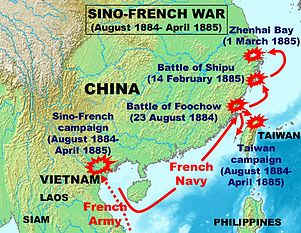
http://en.wikipedia.org/wiki/Sino-French_War
1894. Japan versus China
In 1895, Japan defeated China for
control of Southern Korea.
"Korea and Japan had known nothing but peace for centuries.
When the Japanese arrived with U.S. ships, wearing U.S. clothing,
talking about their divine emperor, and proposing a treaty of "friendship,"
the Koreans thought the Japanese had lost their minds, and told them
to get lost, knowing that China was there at Korea's back. But the
Japanese talked China into allowing Korea to sign the treaty, without
explaining to either the Chinese or Koreans what the treaty meant
in its English translation. In 1894 Japan declared war on China, a
war in which U.S. weapons carried the day. China gave up Taiwan
and the Liaodong Peninsula, paid a large indemnity, declared
Korea independent, and gave Japan the same commercial rights in China
that the U.S. and European nations had". (Email from David
Swanson)
In 1895, Japan defeated China for control of Southern Korea, but
China persuaded Russia, France, and
Germany to oppose a Japanese take-over od the
Liaodong Penninsula. Japan gave it up and
Russia grabbed it. This led to the Japanese
Sneak Attack on Russia and the Japanese
colonization of parts of Korea.
By 1910, Korea was a Japanese
colony, much like a British, French, German, Dutch
or Portuguese colony of the time. A
Western-like military was only part of the story.
Japan employed Samurai-taught
suicidal charges, acting in the name of the divine
Japanese Emperor who sought a wide
Empire.
Remember at this time, Britain and Germany
were engaging in a Naval Arms' race
and Teddy
Roosevelt was leading a military incursion into Cuba against the Spanish
to revenge the mysterious
explosion on the battleship Maine in Havana Harbor.
The weak Spanish Empire can be compared to
the Chinese Empire. In 1896,
Republicans McKinley and Roosevelt
campaigned successfully for an American Empire.
Teddy Roosevelt cared little about the
slaughter of Native Americans or the exploitation of
Chinese immigrants. He seems to have
believed that only whites capable of self-rule.
His display of Filipinos at the St. Louis
World's Fair depicted them as "savages who
could be tamed by white men".
He blocking Chinese immigration.
Japanese Sneak Attack in 1904 Demolishes Russian Fleet
The first Japanese sneak attack
occurred in 1904. Except for the fact that it
was carried out by Japanese
battleships instead of airplanes, it was similar
to Pearl Harbor. Without
warning and while the Russian ships were anchored
at Port Arthur, the Japanese Navy
attacked. .
"On the evening of the 8th. of February, Togo sailed 10 Torpedo Boats with
orders to attack the Russian ships anchored at Port Arthur. No war had been declared
by Japan on Russia, it was the pre cursor to Pearl Harbor when on the 7th. of December
1941,
Japan cowardly attacked the US Fleet without any warning. The Torpedo Boats approached
with stealth to find the cruiser Pallada very conveniently illuminating the scene
with her searchlights.
The Russian ships were silhouetted nicely, like sitting ducks awaiting their fate. In two
groups
of five, the Japanese Boats unleashed their deadly torpedoes, to then escape seawards....
On the 9th. of February Vice Admiral Togo's larger ships poured fire into the Russian
Fleet, the
Russians caught unawares were decimated, no word of war being declared."
http://ahoy.tk-jk.net/macslog/RussiaversusJapan.TheBatt.html
Teddy Roosevelt approved: He wrote
secretly, "I was thoroughly well pleased
with the Japanese victory, for Japan is playing our game."
http://www.jamesbradley.com/the-real-lesson-of-pearl-harbor.htm
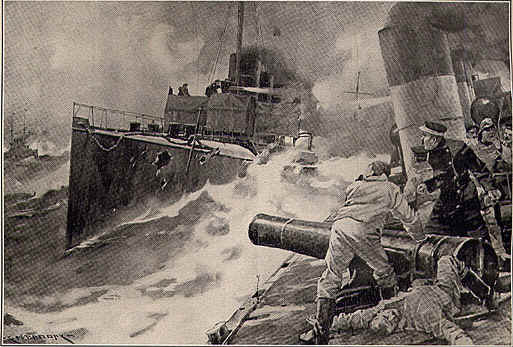 .
.
By defeating the
Russians, the Japanese thereby took control of parts of
Manchuria, including a new
railroad, timber lands and its seaports.
Korea - A Colony within the Japanese Sphere of Influence.
"In 1905, President Theodore Roosevelt secretly urged
Japanese leaders to develop
a "Japanese
Monroe Doctrine for Asia." Roosevelt encouraged the
Japanese navy to seize
"a paramount interest in what surrounds
the Yellow Sea, just as the United States has a paramount interest
in what surrounds the Caribbean."
Unknown to Congress and his own State Department,
Theodore
Roosevelt agreed to a secret, unconstitutional treaty with Tokyo allowing the Japanese
military to seize Korea and initiate
their Japanese Monroe Doctrine for Asia."
( http://www.jamesbradley.com/the-real-lesson-of-pearl-harbor.htm
)
Teddy wrote to his son Kermit,
"I have of course concealed from everyone -- literally
everyone -- the fact that I acted
in the first place on Japan's suggestion . . .I have kept the secret very successfully,
and my dealings with the Japanese in particular have been known to no one."
He was explaining that his moderation of peace negotiations between Japan and Russia had
all
been previously worked out in secret with Japan . ."
The Rise of Japanese FASCISM:
SAMURAI INFLUENCE
1873 Nearly all leaders in Japanese society during the Meiji period
were ex-samurai
or descendants of Samurai,
and shared a common set of values and outlooks.
The rise of universal military conscription, along with the
proclamation of the
Imperial Rescript to Soldiers and
Sailors in 1882 enabled the military to indoctrinate thousands
of men from various social
backgrounds with military-patriotic values and the concept the
unquestioning loyalty to the
Emperor was the basis of the Japanese state (kokutai).
Worship of The Emperor
as a Divine Incarnation was taught by the Constitution and by the
Army and Navy.
The 1919 Treaty of Versailles did
not grant Japan new territory. The Washington
and London Naval Treaities of the
1920s limited the size of the Japanese Navy to a
level of 60% of that of the US and
of Britain. The Japanese military and the
right-wing Samurai spawned
ultra-Nationalist societies considered this a national insult
that must be avenged.
Intellectuals
like Ikki Kita
advocated a special
Japanese Nationalism.
The Parliament would be
replaced by a military dictatorship which would end
the corrupting political influences
of business and private interests.
. In the 1920s Shumei Okawa "helped
popularize the concept of the inevitability
of a clash of civilizations between Japan and the west. Japan needed
to return to its traditional kokutai
traditions in order to survive the increasing social
tensions created by
industrialization and foreign influences."
Ultra nationalist Nakano Seigo believe
Japan could be reborn by reviving a blend
of the samurai ethic, Neo-Confucianism,
and populist nationalism
modeled on
European fascism. Sadao Araki underscored
the parallels between Prussian
militarism and the old Samurai Bushido code. As minister of the Army
and then Education in the 1930s, he
brought Samurai Fascism into mainstream
Japanese politics. The son of an ex-Samurai, he rose quickly within
the Army. Later he went to the
Army Staff College where he was
head of his claff. He was made
a military attache in St. Petersburg
during WWI. He became a fierce
anti-Communist and served in Japan's
and Bolshevik intervention in
Siberia in 1918-1919. He was made a
General in 1923. In May 1932.
a clique of young naval officers and army
cadets assassinated the Japanese
Prime Minister. Sadao Araki expressed
strong sympathy with the assassins,
who received only mild punishment.
"The failure to severely punish the plotters in the May 15
Incident further
eroded the rule of law and
the power of the democratic government in
Japan to confront the
military."
http://en.wikipedia.org/wiki/May_15_Incident
